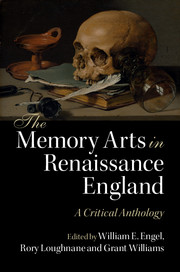Book contents
- Frontmatter
- Dedication
- Contents
- List of figures
- Acknowledgements
- A note on abbreviations
- Introduction
- PART I The art of memory
- PART II Rhetoric and poetics
- PART III Education and science
- PART IV History and philosophy
- PART V Religion and devotion
- PART VI Literature
- Introduction to Part VI
- POETRY
- VI.1 John Skelton, ‘Upon a Dead Man's Head’ (1527)
- VI.2 Edmund Spenser, The Faerie Queene (1590)
- VI.3 Anthony Sherley, Wit's New Dial (1604)
- VI.4 Richard Niccols, Mirror for Magistrates (1610)
- VI.5 Abraham Holland, ‘A Funeral Elegy’ (1626)
- VI.6 George Herbert, The Temple (1633)
- VI.7 Francis Quarles, Emblems (1635)
- VI.8 Mary Fage, Fame's Rule (1637)
- VI.9 Margaret Cavendish, selected works
- VI.10 John Milton, Paradise Lost (1674)
- PLAYS AND PROSE
- Index
- References
VI.7 - Francis Quarles, Emblems (1635)
from POETRY
Published online by Cambridge University Press: 05 August 2016
- Frontmatter
- Dedication
- Contents
- List of figures
- Acknowledgements
- A note on abbreviations
- Introduction
- PART I The art of memory
- PART II Rhetoric and poetics
- PART III Education and science
- PART IV History and philosophy
- PART V Religion and devotion
- PART VI Literature
- Introduction to Part VI
- POETRY
- VI.1 John Skelton, ‘Upon a Dead Man's Head’ (1527)
- VI.2 Edmund Spenser, The Faerie Queene (1590)
- VI.3 Anthony Sherley, Wit's New Dial (1604)
- VI.4 Richard Niccols, Mirror for Magistrates (1610)
- VI.5 Abraham Holland, ‘A Funeral Elegy’ (1626)
- VI.6 George Herbert, The Temple (1633)
- VI.7 Francis Quarles, Emblems (1635)
- VI.8 Mary Fage, Fame's Rule (1637)
- VI.9 Margaret Cavendish, selected works
- VI.10 John Milton, Paradise Lost (1674)
- PLAYS AND PROSE
- Index
- References
Summary
About the author
Francis Quarles (1592–1644) travelled with Inigo Jones to Heidelberg in the wedding entourage of Princess Elizabeth, and, in the 1620s, to Dublin as secretary to Archbishop Ussher. His somewhat pedestrian allegorical poetry on sacred themes was well received, especially Emblems (1635) and a collection of political aphorisms, Enchiridion (1641).
About the text
Quarles's Emblems successfully transplanted into Protestant England an aspect of the Catholic emblem tradition involving dialogues between Divine Love and the Soul. Influenced by two continental Jesuit emblem books, Hugo's Pia desideria (1624) and the multi-authored Typus mundi (1627), Quarles found a way, with plates copied by the celebrated engraver William Marshall and others, to replicate for English sensibilities the spiritual and emotional qualities of Ignatian meditative techniques. The example here, typical of his five-book collection, consists of a picture with accompanying biblical citation, admonitory poem expatiating on the scriptural verse, prose passage from Church Fathers, and an epigram that wraps up the whole and invites further contemplation. The motto under the image, repeated as the poem's title, sets the tone for the verse commentary which immediately implicates the reader in the concern being expressed, in this case: ‘O wretched man that I am! Who shall deliver me from the Body of this Death?’ (Rom. 7:24).
The arts of memory
Quarles's method, steeped in the Ramist rhetorical tradition of mining every aspect of a worthy topic of invention, presents a clear pattern of the spiritual pilgrimage for readers to follow. The mimetic and yet often incongruously jolting quality of the pictures transforms them into mnemonic allegories of spiritual truths. In his introduction he provides a key to unlock these memory images: ‘An emblem is but a silent parable’ (A3r). Each chapter in Emblems is an explicit charge to remember the perennial themes of contemptus mundi and memento mori, thereby conveying a message and a memory practice reinforced by the combination of word and image.
Textual notes
Fra. Quarles, Emblemes, Divine and Moral (London, 1635), S6v–S8r.
- Type
- Chapter
- Information
- The Memory Arts in Renaissance EnglandA Critical Anthology, pp. 305 - 309Publisher: Cambridge University PressPrint publication year: 2016



